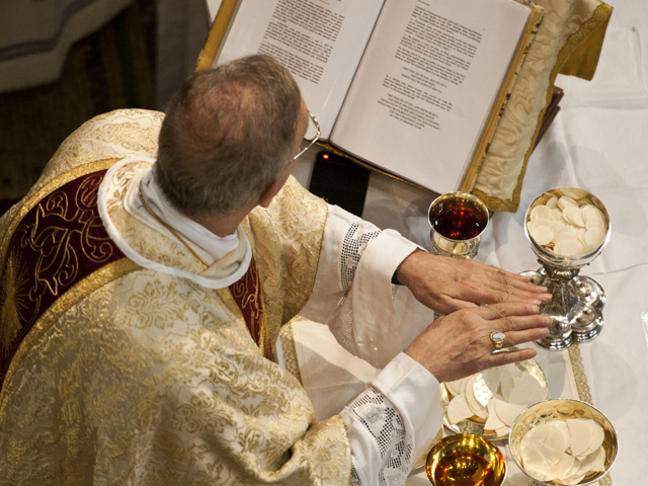
St. Thomas Aquinas described an error of the first type as presumption, that of the second type as despair. Both he considered to be sins against the virtue of faith. I think it is a really good idea to think about how wrong these two attitudes are. Everything wrong is unhealthy. If you are presumptuous of God, that is unhealthy. If you are despairing of God’s help, that is too. God wants you to be healthy and happy.
The presumptuous person thinks that health consists in all signs always pointing to ‘yes,’ as it were. He can’t imagine how God could ever disagree with him, nor how he could really be wrong about anything. Yikes. But optimism isn’t the same thing as having a healthy outlook, despite what pop-psychology would suggest. St. Thomas considered despair a worse sin than presumption, but I think even if it is not categorically worse, I think it is more dangerous, because it’s harms are more subtle, and thus, harder to identify, and thus, harder to root out. Being a totally orthodox Catholic still doesn’t mean that you are always going to be aware of what God wants. Acknowledging the truth of the creed doesn’t mean that you understand it, doesn’t mean that it has planted itself into your soul. There is understanding and then there is understanding. You spent the first, I don’t know, twenty years of your life learning what the Church teaches, now you need to figure out what it really means. These are not the same thing. I have met too many Catholics who equate knowing the catechism with knowing God, the world, the soul, virtue. Knowing the catechism is a necessary first step, yes, but it not sufficient for knowing God. Too many Catholics think that ‘me’ being right is actually important.
Think about this for a second: being right is not important. You being right is not important. You are a flea, a nothing. God is everything. At one point in his life St. Francis de Sales went through a profound period of deep despair. He was certain that God had willed his damnation. That sounds really strange, but in his great honesty St. Francis had to admit that it was possible. Some people cannot even imagine the possibility! Anyway, how St. Francis was able to find peace in light of acknowledging this horrible possibility was really amazing: “If God wills my damnation, then that is great, because God’s will is great!” In other words, he realized that he didn’t matter, God matters. He left it to God to worry about. And that is how we should be. That I have the true Faith doesn’t matter – that is, if you treat it like a possession to be kept in a box and bragged about. Faith is meant to be spread and loved, that is what matters. It isn’t your property, so don’t treat is as such. The fact that so many orthodox Catholics have a certain smugness about being right is bizarre to the extreme.
Then there are those who think that every pleasant thing must be bad. That every happiness they experience must be a sinful indulgence. This is to think that God made me to be unhappy, that God wants me to be unhappy, that the world is not a beautiful, pleasant place to be. What is at play here—which is why St. Thomas said it was a worse sin than even presumption—is an unworthy conception of God: that He is not kind. Does this idea live in you somewhere, to some extent? If you are a person who has suffered grave disappointments then it is likely that you have entertained a conception about God like this. So much of our psychological formation occurred when we were very young. I am of the opinion that one of own children’s skittishness resulted from his traumatic birth. In other words, you are not to blame for having this negative outlook, but you have to move beyond it. Meditate on the meaning of the Passion:
For God so loved the world that he gave his one and only Son, that whoever believes in him shall not perish but have eternal life. For God did not send his Son into the world to condemn the world, but to save the world through him. (Jn 3:16-17)
Viewed from this perspective, God doesn’t seem like someone who is out to get you, who wants you to just barely get through life. “The glory of God,” said St. Irenaeus, which is a passage St. John Paul II loved to quote, “is man full alive.”
I don’t know why you have this idea of God. You probably don’t know why either. It is a twisted interpretation of the notion of sacrifice. It is pagan. Christians, however, do not do penance to be miserable, because God likes us to be miserable, that He is threatened by our happiness. God wants us to be happy. Therefore, the best penance you can do is the kind that frees you from the harmful addictions that do not make you happy. These can be what we are accustomed to think of as addictions: to drugs, alcohol, sex; or they can be addictions to comfort, security, being sad, being content never to stick your neck out, as well as to those things that are a bit more obvious: like to TV, browsing the internet, chocolate, etc.
The fact is, presumption and despair keep you from attaining to what you already believe you have: an idea of what God wants from you, an idea of who God is.
It is healthy to doubt yourself. But it is not healthy to doubt everything you do. What is the best by far is being able to differentiate what appears to be good from what actually is. God’s will for you is always much closer to what really is good than what simply appears good. The presumptuous person always thinks his will is good; the despairing always thinks his will is bad. Both are wrong. Get used to thinking about what is truly good. The presumptuous think that everything they want is God’s will; the despairing think that what they want cannot possibly be God’s will.
Let me give some examples. Should you do something you really want to do? – like visit a place you have always wanted to see, date someone you are really attracted to, take a job that sounds really fun, become a priest because that sounds amazing!
– If you are not sometimes doing things you do not like because you know it is God’s will, you are the presumptuous kind of person.
– If you are not sometimes doing things you love, you are the despairing sort of person.
You cannot look at the act itself. Is everyone in the seminary following God’s will? It is doubtful. A person who is there because he thinks the priesthood is a great way to attain power and security, is not following God’s will. You can’t simply say that because you are not doing what everyone obviously wants to do—to get married and have sex—that you are therefore following God’s will.
During my first year of marriage I really struggled with the thought that I had disobeyed God because I really wanted to marry my wife to whom I was (and still am) deeply attracted, and didn’t do the ‘harder thing’ of becoming a priest and giving her up. But if I look back, my desire—and love—for my wife enabled me to persevere through a lot of hard things. If I didn’t love and desire her, I could not have persevered through these difficulties, difficulties that were actually great works for God – like raising six wonderful children for God.
God’s will is the opposite of fulfilling your ego, and has nothing to do with the negative ideas you might have formed about what is a fact: that God has great joys in store for you.

Colin wrote this Article for the Knights of the Holy Eucharist. He has been married to Anne-Marie since 1999, and they are proud to raise their six children, in a small town in Ontario, Canada. Colin has a PhD in Theology and works tirelessly to promote the Gospel. “Just share the Word,” is what he believes the Lord says to him – and so he does. He recently founded The Catholic Review of Books, a printed journal and website dedicated to “all things books” from the perspectives of faithful Catholics. He is fascinated by the concept of chivalry as it applies to being a man and a father in today’s crazy world.



